Arts Feature: Best Movies (With Some Disappointments) of 2022
Compiled by Bill Marx
Our demanding critics choose the best films (along with some disappointments) of the year. And there is plenty of disagreement.
Gerald Peary
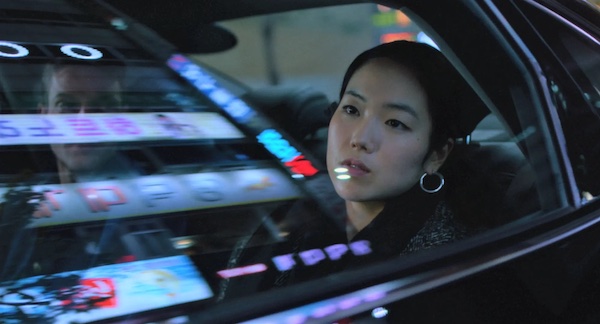
Park Ji-Min in Return to Seoul. Photo: Thomas Favel/Aurora Films/Sony Pictures Classics
Best Film of 2022 — Return to Seoul (Davy Chou)
The rest of the 10 Best
The Banshees of Inisherin (Martin McDonagh)
The Fabelmans (Stephen Spielberg)
RRR (S.S. Rajamouli)
Dos Estaciones (Juan Pablo Gonzalez)
One Fine Morning (Mia Hansen-Love)
Paris 13th District (Jacques Audiard)
The Good Boss (Fernando Leon de Aranoa)
Nitram (Justin Kurzell)
The Eternal Daughter (Joanna Hogg)
And these distinguished runners-up:
There There (Andrew Bujalski)
Happening (Audrey Diwan)
Emily the Criminal (John Patton Ford)
Causeway (Lili Neugebauer)
The Menu (Mark Mylod)
She Said (Maria Schrader)
EO (Jerzy Skolimowski)
The Quiet Girl (Colm Bairead)
Babylon (Damien Chezelle)
The Innocents (Eskit Vogt)
Best Documentary:
2nd Chance (Ramin Bahradi)
The rest of the 10 Best:
Retrograde (Matthew Heineman)
The Balcony Movie (Pawel Lozinski)
The Janes (Emma Pildes, Tia Lessin)
Last Flight Home (Ondi Timoner)
Louis Armstrong’s Black & Blues (Sacha Jenkins)
Moonage Daydreams (Brett Morgan)
Riotsville USA (Sierra Pettengli)
The Will to See (Bernard-Henri Levy)
Navalny (Daniel Roher)
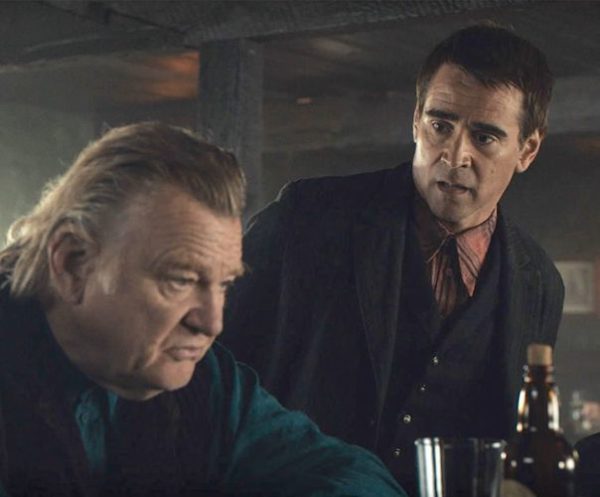
Brendan Gleeson and Colin Farrell in a scene from The Banshees of Inisherin.
Best Actor: Javier Bardem, The Good Boss
Runners-up: Colin Farrell and Brendan Gleeson, The Banshees of Inisherin;
Ralph Fiennes, The Menu; Ram Sharan, RRR
Best Actress: Ji-Min Park, Return to Seoul
Runners-up: Tilda Swinton, The Eternal Daugher; Teresa Sanchez, Dos Estaciones; Danielle Deadwyler, Till; Vicky Krieps, Corsage and Hold Me Tight
Best Supporting Actor: Rory Kinnear, Men
Runners-up: Chris Pine, Don’t Worry Darling; Bryan Tyree Henry, Causeway; Andre Braugher, She Said; Seth Rogen, The Fabelmans
Best Supporting Actress: Hong Chau, The Menu and The Whale
Runners-up: Kerry Congdon, The Banshees of Inshiren; Molly Gordon, There There; Tatin Vera, Dos Estaciones; Frankie Corio, Aftersun
Best Screenplay: Martin McDonagh, The Banshees of Inisherin
Runners-up: Andrew Bujalski, There There; Davy Chau, Return to Seoul; Tony Kushner, The Fabelmans; Joanna Hogg, The Eternal Daughter
Best Direction: S.S. Rajamouli, RRR
Runners-up: Martin McDonagh, The Banshees of Inisherin; Davy Chau, Return to Seoul; Stephen Spielberg, The Fabelmans; Juan Pablo Gonzalez, Dos Estaciones
Best First-Time Director: Charlotte Wells, Aftersun
Best Ensemble: She Said
Best Cinematography: Senthil Kumar, RRR
Best Editing: Tom Cross, Babylon
Best Music Score: Justin Hurwitz, Babylon
Most overrated film: Tár
Steve Erickson
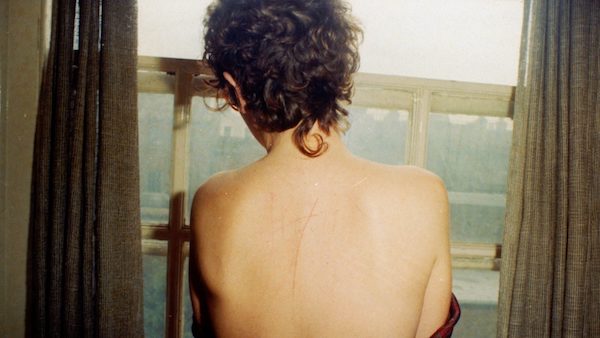
A scene from the documentary All the Beauty and the Bloodshed.
Top 10:
We’re All Going to the World’s Fair
All the Beauty and the Bloodshed
Neptune Frost
Saint Omer
Resurrection
Something in the Dirt
Feast
The Eternal Daughter
The Cathedral
Jackass Forever
Disappointing:
Top Gun: Maverick
The lengths this film goes to in order to keep the details of its story of American pilots bombing a mysterious country — Russia? Iran? a forest in Canada? — vague while still functioning as military recruitment propaganda are hilarious .’80s Cold War action movies were far more honest. It’s entertaining, to be sure, and shows off Joseph Kosinski’s directorial skill, but for this year’s dose of right-wing nationalism, I’ll choose RRR.
The Whale
Isn’t it great that Brendan Fraser has a comeback vehicle? Too bad that it requires him to objectify and degrade himself by putting on a fat suit and participating in a story that alludes to his real-life problems and the changes in his body over the last 20 years.
Men
“Elevated horror” bottoms out into a faux-feminist view of women as eternal victims and surface-level surrealist imagery and metaphors.
Ed Symkus
I fondly remember the days when I would regularly trek to the cinema to see my movies on the big screen. Alas, the plague changed things, and much of my viewing was relegated to my home — watching new releases either on the living room TV or the desktop computer (depending on whether my wife had commandeered the Sony Bravia to catch up on her Seth Meyers monologues). Yes, I’ve been back to the cinema occasionally, but not enough. And there is no comparison between experiencing motion pictures on a 21-inch screen and an 80-foot one. Still, it was not very difficult to pick out some great entries this year.
MY 10 FAVORITES (alphabetically)
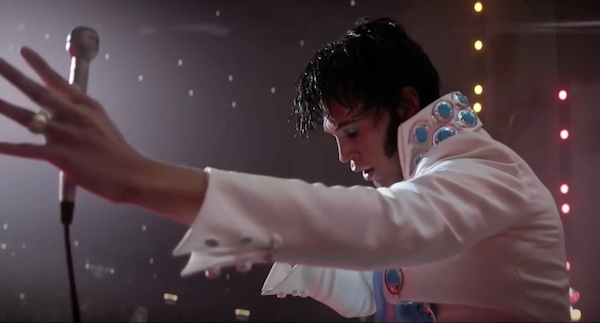
Austin Butler as Elvis in Elvis.
Babylon – Damien Chazelle looked up the word “spectacle” in his Funk & Wagnalls, then rounded up some beautiful people — Brad Pitt, Margot Robbie, Diego Calva — to tell a story of depravity in Hollywood in the late 1920s.
Elvis – No doubt, Mr. Chazelle was influenced by Baz Luhrmann, especially by his glitzy Moulin Rouge! But it was Luhrmann who dazzlingly brought the colorful life of Presley and his shifty manager to the screen. And a terrific lead performance by Austin Butler helped!
Everything Everywhere All at Once – A perfect example of what happens when the IRS gets in the way of normal, everyday people who happen to be jumping back and forth between different universes, but have no control over where they land. A funny, exciting, and thoughtful film.
The Fabelmans – Steven Spielberg’s lightly fictionalized autobiographical fable (he is, after all, a fable man) focuses on a geeky teenager who, despite many coming-of-age problems — such as dealing with his parents as well as with bullies — intends to go after his dream of becoming a filmmaker.
Moonage Daydream – Energetic and contemplative at the same time, Brett Morgen’s career-spanning documentary about art-rocker David Bowie is jam-packed with performance highlights but keeps going back to Bowie and his own words to explain what was going on inside his creative, chameleonic head.
The Pale Blue Eye – A cadet in a 19th-century military academy hangs himself, but then someone cuts out his heart. Yikes! Better call in private detective Augustus Landor (Christian Bale). But, wait! Another dead cadet, another missing heart! Looks like it’ll take one more cadet — Edgar Allan Poe (Harry Melling) — to help solve the mystery.
RRR – Let’s go back to that word “spectacle,” and my opinion that neither Damien Chazelle or Baz Luhrmann can hold a candle to Indian director S.S. Rajamouli’s astonishing epic about what two real-life early-20th century men, who never met, would’ve done if they had. There’s a kidnapping, some epic battle scenes, ferocious CGI animals and, at the film’s heart, doses of friendship, brotherhood, and loyalty.
Top Gun: Maverick – Hell, I didn’t even want to see this one, mainly because I’ve always thought the original film was a vastly overrated macho pile of yahoo movie clichés. But I’m glad I did see it because, while it comes across as more of a remake than a sequel, the filmmakers and actors got it right this time.

A scene from Triangle of Sadness.
Triangle of Sadness – Take a bit of the class differences in Downton Abbey, throw in a hint of deserted island power grabbing in Lord of the Flies, add a dash of contemporary celebrity influencing, focus on some grrrl power, and make sure there’s an abundance of projectile vomiting and exploding toilets. Yep, that sums up this crazy movie.
The Whale – Brendan Fraser’s soulful performance may outweigh all of the other pluses in this adaptation of the stage play, but then again, his character — the shut-in online English professor Charlie — weighs about 600 pounds. This is about how the protagonist deals with the few people who come into his limited orbit, and how they try to help — and hurt — each other. A stunning dramatic work, with ample dark humor, from director Darren Aronofsky.
RUNNERS-UP
Corsage, Glass Onion, The Menu, My Policeman, The Outfit
COULD’VE DONE WITHOUT
Catherine Called Birdy, Devotion, The Eternal Daughter, Guillermo del Toro’s Pinocchio, The Northman, Thor: Love and Thunder
Nicole Veneto
Top 10:
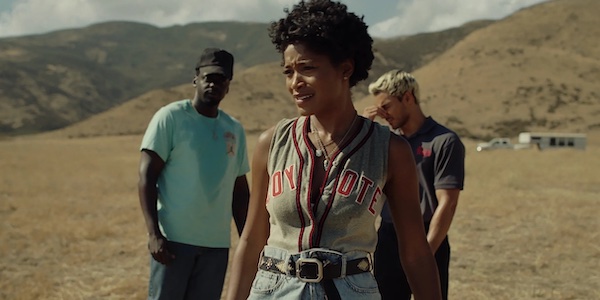
A scene from Jordan Peele’s Nope.
Nope (Jordan Peele)
Jordan Peele doesn’t just make movies — he makes miracles. Like his masterful directorial debut Get Out, Nope is the kind of movie that shouldn’t exist given how beholden the film industry is to preexisting intellectual properties and blasé CG effects. A rumination on “bad miracles” as cinematic spectacle, a treatise on the racially fraught history of film representation from Muybridge to Eastwood, and the be-all end-all ethical argument against treating wild animals as if they’re controllable entertainment. Peele has such magnificent sights to show you, and damned if anything else this year comes close to Nope’s otherworldly perfection.
Bones and All (Luca Guadagnino)
It remains to be seen how Bones and All will fare this awards season after winning big at Venice, but it’s a clear winner in my heart. Luca Guadagnino’s latest is an elegantly directed romantic road-trip film about two young cannibals venturing through the American heartland in search of themselves and the savage nature of their hunger. See it with someone you love after tucking into a nice barbecue dinner, if you’re nasty like I am.
Crimes of the Future (David Cronenberg)
Surgery is the new sex in Cronenberg’s triumphant return to body horror. It’s definitely more restrained — at least when compared to the director’s ’80s heyday — yet anyone worried that Cronenberg’s lost his touch for cinematic viscera will be comforted knowing this is the only movie in 2022 that will give you Léa Seydoux performing cunnilingus on Viggo Mortensen’s perforated stomach. Long live the new flesh baby.
Guillermo del Toro’s Pinocchio (Guillermo del Toro and Mark Gustafson)
A late addition to the list, so I’ll just cite the brief Letterboxd review I wrote the other night while still wiping tears from my eyes:
“One of those rare [family] films that privileges craft and storytelling over building a brand identity to market an IP at stupid impressionable kids who don’t know any better … [del Toro] puts his whole ass fucking heart into what he creates, and perhaps his retelling of Pinocchio is itself a metaphor for the love he infuses his creations with.”
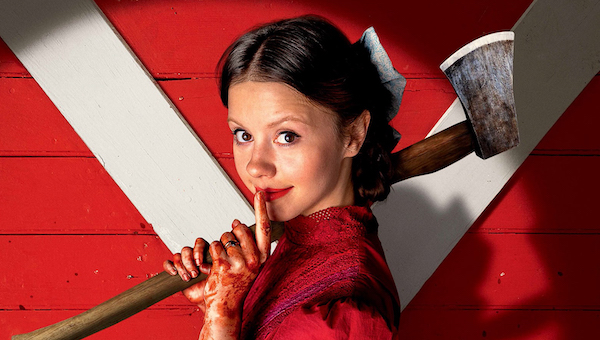
Mia Goth with preferred homicidal weapon in Pearl.
Pearl (Ti West)
A rare instance in which a sequel surpasses the first entry. Pearl solidifies Mia Goth as this generation’s supreme scream queen with a high camp horror romp about a fame-hungry farm girl whose drive for big screen stardom generates a body count. Undoubtedly my “that me” movie of the year considering it combines two of my favorite film tropes: beautiful women mishandling sharp objects and beautiful women on the verge of nervous (and violent) breakdowns. And no, I will never get sick of posting this image when faced with even the most minor inconveniences.
X (Ti West)
The best Texas Chainsaw movie since Tobe Hooper took Leatherface and company the Looney Toons route back in 1986. Ti West’s first entry in the X-verse was an unexpected slam dunk for me despite being lukewarm over his previous film efforts. Goth’s dual roles as both villain (the elderly Pearl) and final girl (porn superstar in the making Maxine Minx) adds a metatextual layer to X’s sexually titillating take on the slasher genre. Carol Clover would have a field day over film. Plus I’ve been dying to get my hands on the same shade of sparkly blue eye shadow Maxine rocks throughout the ensuing massacre.
Jackass Forever (Jeff Tremaine)
What can I say? I am a simple woman who loves a good dick joke. Ryan Dunn 4ever.
Everything Everywhere All at Once (The Daniels — a.k.a. Daniel Scheinert and Daniel Kwan)
Missed this one while it was in the theaters, and though it didn’t resonate with me the way it has for many audiences (it briefly overtook Parasite as the highest-rated film on Letterboxd before that too was overtaken by Come and See), there’s an undeniable charm to the Daniels’ offbeat action-comedy about Michelle Yeoh saving the multiverse. There’s already been some backlash against EEAaO’s particular brand of quirky that’s rubbed people the wrong way, which is a shame because there’s a real beating heart to this tale about the immigrant experience, the trials and tribulations of tax auditing, and mending familial relationships. Plus, Ke Huy Quan’s (Temple of Doom, The Goonies) comeback to the big screen proves we’ve missed out on some serious acting talent, no thanks to Hollywood typecasting.
Tie: Barbarian (Zach Cregger)
Not since Candyman has a horror film so deftly grappled with the urban housing crisis and its racial/gendered fallout as Barbarian does. Previously one of The Whitest Kids U Know, director Zach Cregger hails from similar comedy roots as his horror compatriot Jordan Peele, making for a film that’s both frightening and darkly satirical in execution. Definitely go into this one blind if you can (still) manage to avoid spoilers.
Tie: Bodies Bodies Bodies (Halina Reijn)
FIRST OF ALL A PODCAST TAKES A LOT OF WORK, OKAY? YOU HAVE TO ORGANIZE THE GUESTS, YOU HAVE TO DO A GOOGLE CALENDAR, AN-AN-AND YOU BUILD A FOLLOWING! IT TAKES A LOT OF FUCKING TIME AND I’VE BEEN WORKING ON IT FOR A WHILE!
(The “Rachel Sennott for Best Supporting Actress Oscar” campaign starts and ends with me unfortunately.)
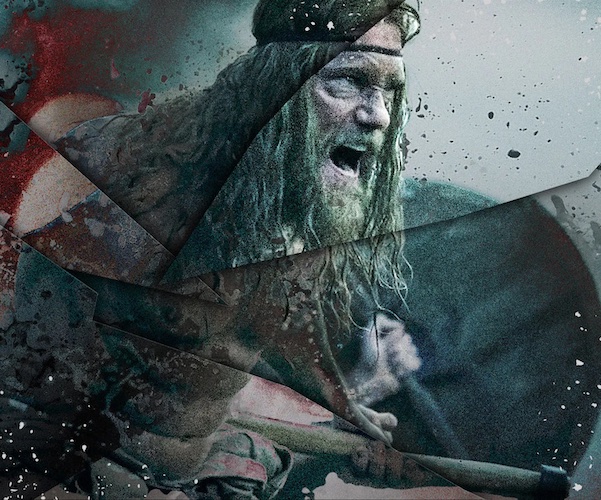
A scene from The Northman.
The Northman (Robert Eggers)
Eggers’s big-budget debut lacks the creative intimacy of his independent efforts like The Witch and The Lighthouse, yet it’s undeniably as heavy metal of a Viking movie as you can hope for. There’s a horse made out of human limbs, Willem Defoe farting, a Björk cameo, and a climactic sword fight atop a volcano between two ripped naked guys, all of which are things you’ll never get from another stupid Thor movie.
Still Haven’t Finished But Definitely in the Top 10
The Kingdom: Exodus (Lars von Trier)
The final episode is scheduled to be released Christmas day on Mubi. So, technically, I haven’t finished the third and final season of von Trier’s Danish Twin Peaks. But it is undoubtedly one of the best things I’ve watched all year. Much as Lynch did with Twin Peaks, von Trier’s sepia-drenched miniseries about the strange and hilarious events surrounding Rigshospitalet’s neurosurgical ward takes the soap opera format and morphs it into a darkly comedic nightmare where old ladies converse with ghosts and women give birth to Udo Kier. And, like The Return, Exodus picks up some 20 years after the second season ended with an outrageous cliffhanger. And the series takes a meta-approach toward its own televised legacy. Love him or hate him, you cannot deny that Denmark’s resident enfant terrible has tapped into something special here.
Honorable Mentions
Decision to Leave (Park Chan-wook)
Weird: The Al Yankovic Story (Eric Appel)
Flux Gourmet (Peter Strickland)
Babysitter (Monia Chokri)
Piggy (Carlota Pereda)
2021 Runoff
Vortex (Gaspar Noé)
The Sadness (Rob Jabbaz)
Pleasure (Ninja Thyberg)
Mad God (Phil Tippett)
Strawberry Mansion (Albert Birney and Kentucker Audley)
The Spine of the Night (Philip Gelatt and Morgan Galen King)
Medusa (Anita Rocha da Silveira)
Biggest Disappointment
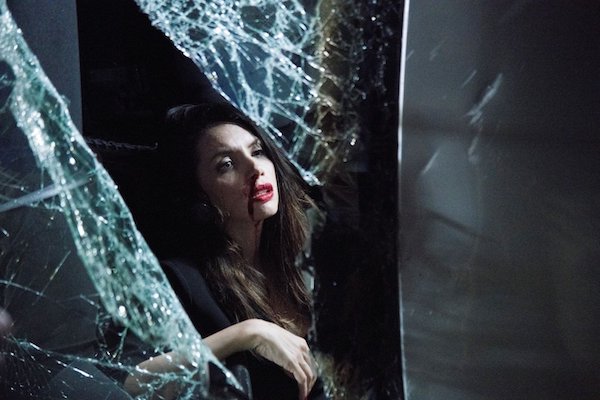
A scene from Dark Glasses.
Dark Glasses (Dario Argento)
Argento’s return to his gialli roots wasn’t as bad as I anticipated it would be, and it’s certainly an improvement over Dracula 3D. Could be worse, but it still plays like a cheap imitation of itself, like a director for hire trying to make an Argento movie that’ll go straight to Netflix. This late in his career, Argento should just go all in on acting (see his heartbreaking lead performance in Vortex).
Honorable(?) “I had fun with it” Mention
Sonic the Hedgehog 2 (Jeff Fowler)
For the record, I hated the first movie, but I begrudgingly went to the theater to see the sequel with my little sister and a couple of my roommates. It helped that I took a bunch of edibles before and during the movie. And if you time your bathroom breaks right you can dip out on all the unimportant human character side-plots that feel like an Expedia commercial from 2013. Yet I have to give Sonic 2 credit if only for this single frame making me laugh harder than anything else this year.
Tim Jackson
2022 has been a surprisingly diverse and divided year for film: the best for one critic is the worst for another (Triangle of Sadness; Top Gun: Maverick). Given all the candidates, it was impossible to rate one documentary against another: profiles (Sidney, Sr, Nothing Compares); history and politics (Three Minutes — A Lengthening, The Janes); popular culture (Dreaming Walls: Inside the Chelsea Hotel, Fiddler’s Journey).
Animation went in many directions: traditional (Minions: The Rise of Gru); dark and experimental (Mad God); Meta (Marcel the Shell with Shoes On); adult themed (Linklater’s Apollo 10 ½: A Space Age Childhood); and as always, Pixar (Turning Red).
The power of the pandemic compelled that films be streamed across a wide range of platforms. That meant many more choices, often shorter theatrical runs, and competition with some increasingly high-profile series television (is it still called television?).
Amid this hodgepodge of art and entertainment here are my picks for features and documentaries worth noting. In alphabetical order.
BEST NARRATIVE FEATURES
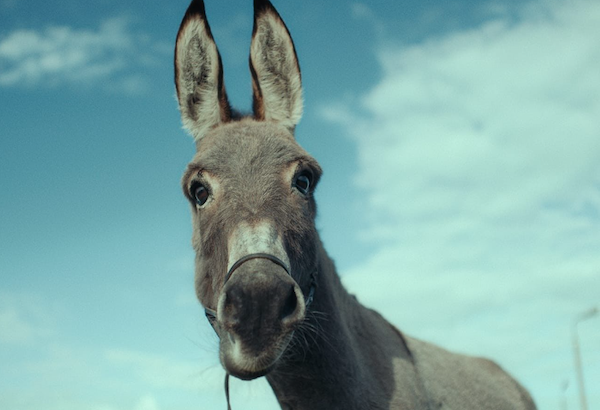
A scene featuring the animal protagonist of veteran director Jerzy Skolimowski’s EO.
Aftersun: (British. At the West Newton and Plimoth Cinemas) In Charlotte Wells’s first feature a woman recalls a long-lost vacation she had as a child with her estranged father. 12-year old Frankie Corio debuts as young Sophie and Paul Mescal (Normal People) is the father. Their excellent performances anchor scenes that call for a variety of subtle emotions. The oblique narrative accumulates dramatic impact as we begin to understand the weight the past on the film’s characters. (Fuse Review)
EO (Polish. Not yet in release) 84-year-old Jerzy Skolimowski’s existential vision looks at the harshness of the world through the eyes of a donkey. EO, set free from a circus, wanders the countryside. The animal’s journey is difficult, but humans fare no better. A meditation on how deeply we are connected to the natural world.
The Fabelmans: Director Steven Spielberg’s romantic retelling of his boyhood as a wannabe filmmaker is as one might expect — slick, colorful, and entertaining. One can grow weary of the glossy Spielberg style, but in a story about his love of cinema, it is irresistible.
The Innocents (Norway. Screening at AMC, Amazon) An ethnically diverse cast of children are at the center of this spooky tale. The camera creeps and prowls, emphasizing the physicality of the children. Ida, the true innocent of the bunch, discovers that others in her housing complex have varying degrees of telekinetic powers. This secret, savage world of kids becomes hauntingly dreamlike, aided by a moaning score and the patient unfolding of the plot.
Playground (Belgium. Screening on Amazon, Mubi, AppleTV) Added to my list of stunning child performances: Maya Vanderbeque. Through her eyes we see the emotional turmoil of childhood conflicts: bullying, insecurity, feelings of powerlessness, and moments of bravery. Director Laura Wandel keeps the camera on the girl’s gaze as she copes with the small-world cruelty of school and playground. Right to the final heartbreaking shot, this is a raw and revealing portrait of childhood.
Return to Seoul (Korea. Not yet in release) Freddie, a woman raised in France, returns to Korea, her country of origin, to meet her birth parents. Newcomer Ji-Min Park performs the role of the protagonist with minimal affect, and not always sympathetically. The story takes place over a considerable amount of time and builds through a network of themes, motifs, interrelationships, and behaviors. Freddie grows older but not always wiser. This is a complex coming-of-age story that supplies insights into a Korea we don’t often see. Awarded Best Non-English Language Film by the Boston Society of Film Critics.
RRR: (Indian. Screening on Netflix) In this monster global hit, a fearless warrior comes face to face with a steely cop who is working for the colonial British. Set in pre-independence India, and inspired by Hindi mythology, this gonzo epic serves up a wild percussive score, dazzling special effects, and imaginative battle scenes filled with fire, wild animals, and outrageous athleticism.
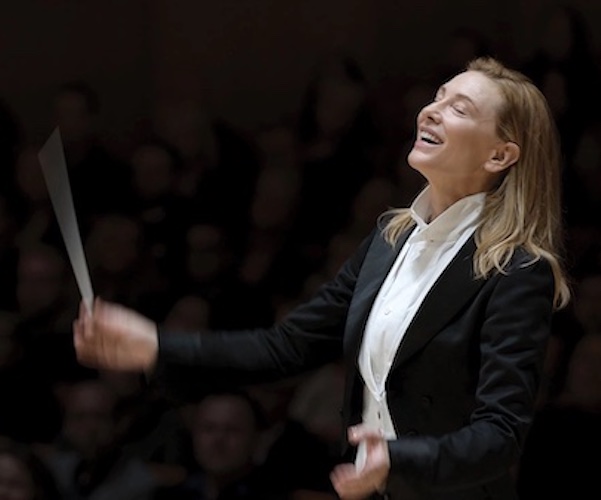
Cate Blanchett in a scene from Tár.
Tár (now playing locally) Cate Blanchett is stellar as a cold, egocentric orchestra conductor preparing for an important concert while fielding harassment charges. As he did in previous films, Todd Fields (The Bedroom, Little Children) immerses the audience in an emotional journey. At the center is Lydia Tár’s slow, desperate unraveling. (Fuse review)
Vortex (French. Screening on Amazon, Mubi, AppleTV) Argentinian/French filmmaker-provocateur Gaspar Noé (Irreversible, Climax) tackles the subject of dementia via two parallel split screens. We observe the lives an elderly man (Dario Argento) and his ailing wife (Françoise Lebrun). The split screen invites us to patiently watch how each member of the couple copes with the challenge of the woman’s dementia. Refreshingly, Noé does not resort to the melodrama that is so often a feature of his style.
Zero Fucks Given (Belgium. Screening on Mubi) A woman is compelled to conform to the indignities of the rules at the airline for which she is a flight attendant. However grueling and dehumanizing the job, she does get to see the world, though mostly in discos. She beds anonymous men in a fruitless search for connection. This is a highly effective naturalistic character study that draws much of its power from the expressions on the face of its stunning lead actress, Adèle Exarchopoulos (Blue Is the Warmest Color).
Also Worth Seeing: The Northman, One Fine Morning, Great Freedom, The Quiet Girl, The Banshees of Inisherin, All Quiet on the Western Front, Triangle of Sadness
DOCUMENTARIES
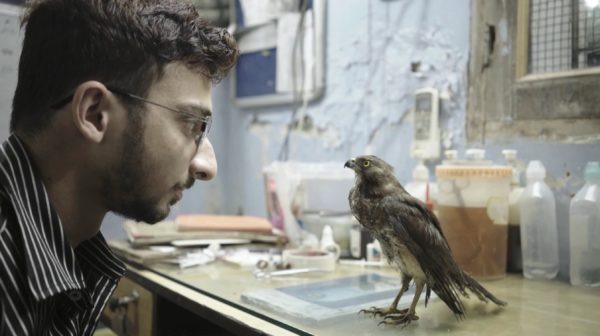
A scene featuring man and bird in All That Breathes.
All That Breathes: This verité-style documentary is the story of two brothers who take it upon themselves to save the birds of New Delhi. Their effort to build a hospital for the kites, a bird often regarded as a pest, becomes a poetic meditation on the interrelationship of all living things.
Girl Talk: Lucia Small’s fourth and final documentary is an ennobling profile of adolescence. She follows a group of girls at Newton South as they struggle in the competitive, male-dominated activity of high school debate. Brilliantly edited by Rachel Clark. (Arts Fuse Remembrance)
Good Night Oppy: Filled with stunning recreations of the NASA mission, this is the story of Opportunity, the Mars Exploration Rover nicknamed Oppy. It is an inspirational tale of individual triumph and scientific achievement.
Moonage Daydream: Brett Morgan mixes David Bowie’s words with flashy montage sequences, concert footage, movie clips, and more to create an entertaining and delirious profile of the musician as an artistic visionary. (Arts Fuse Review)
Young Plato: This beautifully shot film’s charismatic lead, Kevin McArevey, is the headmaster of a school in a gritty area of Belfast, Northern Ireland. The camera observes his classes and conferences, dramatizing how he uses ancient Greek philosophy to help young students think about thinking — as a way to confront trauma and overcome prejudice, violence, and fear.
DISAPPOINTMENTS
Jurassic World: Dominion: Not that I expected much, but the plot of this mess of a film came off like something generated from an outdated computer. The story is ludicrous, the action predicable, the dialogue laughable — there is little sense of what’s happening when, where, or why.
Top Gun: Maverick: The editing is slick and I do like Tom Cruise — really. But at some point he must stop the self-mythologizing. This predictable study of comradeship and dedication is so transparently built around “bro” identity that I suspect that it might have been intended to be a comedy. The clichéd dialogue sounds like one of those old Mad Magazine movie spoofs.
Peter Keough
Here are my picks in alphabetical order.
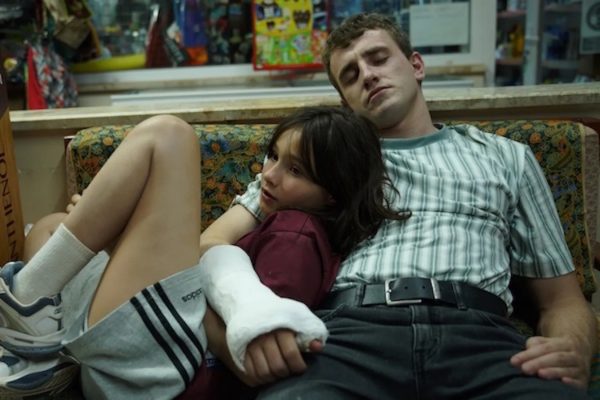
A scene from Aftersun. Photo: A24
Aftersun
In Scottish filmmaker Charlotte Wells’s resonant, oblique feature debut a troubled father tends to his 11-year-old daughter at a Turkish beach resort in the 1990s. The roles reverse as the father sinks into melancholy, its source never specified but its effect ubiquitous. Wells addles the screen with mirrors, with mirrors within mirrors, with camcorder images and TV screens of mirrors within mirrors with the images of the father and daughter duplicated but not quite coming together. Framed by flash-forwards to the now adult daughter as she watches videos of the holiday and by a recurring scene, perhaps imagined, in which she confronts her father, found dancing under strobe lights to “Under Pressure,” the film is a haunting reverie about memory, guilt, loss, and the illusory release of cinema.
Aftersun can be purchased or streamed on Amazon and other platforms beginning December 20.
Decision to Leave
Park Chan-wook’s exhaustively inventive detective story evokes Alfred Hitchcock’s Vertigo (1958) by way of David Lynch, Raul Ruiz, Wong Kar-wai, and the perverse extravagances of his own “Vengeance Trilogy.” In Busan, Korea, police inspector Hae-joon (Park Hae-il) investigates the case of a climber who fell to his death from a mountain. Was it an accident or the work of the man’s beautiful widow? That mystery is overwhelmed by Park’s baroque blurring of past, present, and future and various subjective points of view. Reenactments of past events leak into the present and vice-versa, and flashbacks are more like splashbacks. Played by Tang Wei, the alluring widow haunts the screen with a subtle beauty and a sad half-smile. She leaves those who seek her calling out her name as light fades and the tide rises.
Decision to Leave can be streamed on MUBI.
Earwig
As creepy as the title would suggest, French director Lucile Hadzihalilovic’s adaptation of Brian Catling’s novel nevertheless might seduce you into its unwholesome vision. It’s the childhood nickname of Albert, the film’s anguished and repellent protagonist and caretaker of a young girl whose dentures, made of ice, need constant replacing. Once that willing suspension of disbelief is achieved, however, the film doesn’t get any easier to absorb as Hadzihalilovic pursues skewed and overlapping story lines with a sour dream logic. The color palette is toxic, the soundtrack terrifying, and the details tap into a Freudian cabinet of curiosities and insinuating symbols. Every surface seems tainted and unhygienic and likely to inflict a septic wound. This is for those who want horror films to bring them to the edge of the abyss — and then push them in.
Earwig can be streamed on MUBI.
EO
Heartbreaking and sublime, Jerzy Skolimowski’s updating (to the even more heartless 21st century) of Robert Bresson’s masterpiece Au Hasard Balthasar (1966) features the title donkey as the year’s most compelling and courageous protagonist. Driven by obtuse authorities from the tawdry Eden of a Polish circus and the love of his angelic trainer, the onomatopoeically named EO stumbles through a tour of Europe’s cruelties and attractions that include the drunken adulation and abuse of warring soccer fans and the problematic attentions of an aristocratic Isabelle Huppert. Its blunt depiction of inhumanity is hard to watch at times, but its celebration of the inhuman is gorgeous and epiphanic.
EO opens December 23 at the Coolidge Corner Theater.
The Eternal Daughter
A ghost story in the manner of Henry James and Rod Serling, Joanna Hogg’s latest foray into quasi-autobiography features the astonishing Tilda Swinton in the dual role as Julie, Hogg’s filmmaker stand-in from Souvenir (2019) and Souvenir: Part II (2021), and Julie’s mother Rosalind. The former has taken the latter to a hotel for her birthday, a place where Rosalind has spent many happy and — as is discreetly revealed — unhappy moments in her life. Suspiciously, the place seems empty, inhabited only by unsettling, sourceless noises, a sullen concierge, and a genial, mystery factotum whose appearance comes as a relief. Hogg builds atmosphere with the haunting, limpid soundtrack, sets that seem taken from old Universal horror movies, and a gentle, but insinuating progression into an inevitable revelation.
The Eternal Daughter can be streamed on Apple, Amazon and other platforms.
Geographies of Solitude
Sable Island, a fingernail wisp of land (27 miles long by a mile wide) in the middle of the North Atlantic 100 miles off Nova Scotia, is home to bugs, seabirds, feral horses, and, for 40 years, the naturalist Zoe Lucas. There, among other duties, she collects and inventories flotsam and jetsam washed ashore. In her bleak but exuberant film Jacquelyn Mills immerses herself in Lucas’s routines and the life on the island, recording stunning images ranging from starry night skies looming over a shipwreck to Lucas’s collections of plastic bottles, piles of rope and net fragments, and countless “nurdles,” the plastic pellets that degrade into microscopic bits that are swallowed by animals, often killing them. This in the seeming isolation of a desert island far from civilization. However, this is no environmental tract, but rather a transcendent record of a specific environment and the solitary environmentalist trying to preserve it.
Geographies of Solitude can be seen January 25-31 at the Anthology Film Archive in New York.
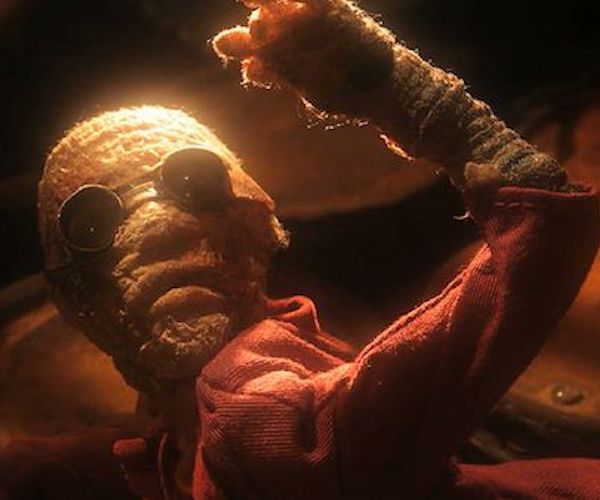
A scene from Mad God.
Mad God
Phil Tippett, special effects maestro on films such as RoboCop (1987), Jurassic Park (1993), and Starship Troopers (1997), spent 30 years creating this apotheosis of hell, and probably we will never see its like again. A diabolical combination of the meticulous, stop-motion bestiaries of Jan Svankmejer, the visionary grotesqueries of Hayao Miyazaki (minus the whimsy), and the circular solipsism and minute particulars of William Blake’s “The Mental Traveler,” Tippett creates not just one world but an infinity of self-reproducing universes populated by a pandemonium of abominations of varied sizes who devour one another in a ceaseless, hideous, and stunningly sublime round of mindless victimization. Lording over this creation is the Mad God himself, played by director Alex Cox, who sends an endless series of “Assassins” in steam-punky deep sea diver garb into the abyss to blow the cosmos up so it can be started anew. Puts our current problems in perspective, and not in a good way.
Mad God is available on Shudder.
No Bears
In the 12 years since he was convicted of “propaganda against the Islamic Republic” and sentenced to a 20-year ban from making films (among other punishments) Jafar Panahi has covertly finished as many films (by my count) as he did before his 2010 run-in with authorities. His most recent follows in the delightfully, deviously self-reflexive mode of his first post-incarceration opus, which bore the Magritte-inspired title This Is Not a Film (2011). Once again he is the protagonist, here directing via Zoom a film he is shooting in neighboring Turkey. To get as close as possible to the production he has set up an office in a backwater village close to the border. As in his 3 Faces (2018), he gets involved in the intrigues of the superstitious, ignorant, and intolerant locals while at the same time the real lives of those working on his film within a film take a turn for the worse. Not as formally elegant as some of his other efforts but evoking a darker and more anxious mood as befits the ongoing turmoil in his country — including his own imprisonment in July.
No Bears is currently unavailable for streaming.
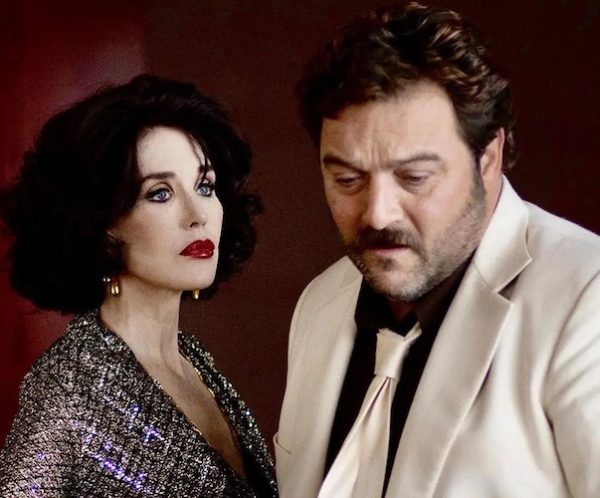
A scene from Peter von Kant.
Peter von Kant
Rainer Werner Fassbinder’s The Bitter Tears of Petra von Kant (1972), a study of a predatory lesbian fashion designer in extremis, pitches volatile, often self-dramatizing emotion against a gleefully kitschy, stage-bound set (Fassbinder originally wrote it as a play). In his spirited, acute remake François Ozon changes the name, gender, and profession of the protagonist, opens it up a bit cinematically, and achieves a homage that is also a unique work of art and a critique of filmmaking. Played by Denis Ménochet as a sybaritic and despairing version of Fassbinder himself, von Kant transforms a working class stiff wannabe actor into an image — a reverse of the Pygmalion process — and he in turn spurns von Kant’s attentions for bigger game in the movie business. Ozon injects warmth, energy, and pathos into Fassbinder’s film, adding intensity to its hellish final scene in which Peter is sealed in a room, cursing and beseeching the figment he has created as it flickers on a screen.
Peter von Kant is available on DVD, Blu-Ray, and via streaming on Amazon, iTunes, and other platforms.
Return to Seoul
Identity proves elusive and exhilarating in French-Cambodian director Davy Chou’s richly layered, intense, and inventive character study. Freddie (a phenomenal Park Ji-Min), a Korean adopted as an infant by French parents, has on the spur of the moment opted to travel to the country of her birth. Her life seems composed of such spontaneous impulses (sleeping with strangers, taking on a job as an arms merchant), but invariably she is drawn back to her origins as the daughter of a poor schmuck from the sticks and the woman who abandoned her and her father for the big city. The film (winner of this year’s Boston Society of Film Critics award for Best Film) spans eight years during which Freddie undergoes many changes, though an essential core of longing and inevitability persists, an inchoate spirit that Chou touches in a manner reminiscent of Wong Kar-wai and Jiǎ Zhāngkē.
Return to Seoul will open in New York and Los Angeles February 17.
Peg Aloi
2022’s Best Documentaries
It was an outstanding year for documentary films. This genre continues to evolve, and its growth is inspiring some brilliantly entertaining and informative efforts. I didn’t see all the documentaries of 2022, but here are the ones I saw that I loved immensely, several of which first premiered at the Sundance Film Festival in January.
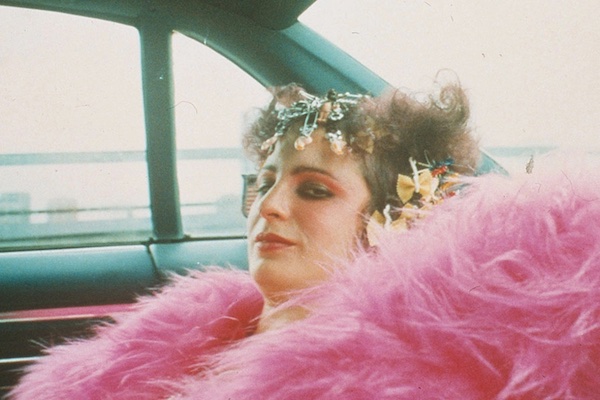
A scene featuring photographer Nan Goldin in All the Beauty and the Bloodshed.
All the Beauty and the Bloodshed ~ Laura Poitras (Citizenfour) directs this film about photographer Nan Goldin and her fight to hold the Sackler family, the owners of Purdue Pharma, accountable for their responsibility for the opioid crisis in America. But in addition to documenting Goldin’s passionate activism, the film explores the artist’s iconoclastic photography and her early years in a decadent, chaotic New York City art scene. Goldin’s candor and political activism make this a compelling, incendiary story of artistic struggle and personal redemption.
All That Breathes ~ This quiet, beautiful film by Shaunak Sen has won a number of prestigious awards. The film follows the activities of two brothers who run a wild bird rescue out of their home in New Delhi, India. In addition to caring for the birds (mostly carrion eaters like kites, which the brothers have loved since they were young boys), the pair, who also have their share of struggles living in a crowded city, do what they can to raise awareness about the plight of the wildlife in New Delhi, which is suffering undue illness and death because of the toxic air pollution that permeates the city. This is a heartwarming yet harrowing look at people living alongside nature in ways that try to undo the damage human civilization has wrought.
Moonage Daydream ~ I was fortunate to see this on the big screen. As a longtime David Bowie fan I found it rather magical and completely absorbing. Filmmaker Brett Morgen gathers an astounding number of video clips of performances, interviews, and other filmed content, including footage of Bowie’s travels. The layering of music, spoken word, and imagery becomes almost overwhelmingly intense at times. The film is a brightly colored, dense, sensual, and immersive reminder of the artist’s genius, from his controversial decisions to his otherworldly humanity. Despite some odd omissions of significant biographical information, Moonage Daydream is a comprehensive look at Bowie as an artistic and social icon.
Descendant ~ This film looks at descendants of survivors of the Clotilda, the last ship to bring enslaved Africans to the United States, which sunk at sea and was thought lost for many years. Filmmaker Margaret Brown (The Order of Myths) interviews local residents of Mobile, Alabama, where a community and neighborhood grew up in the wake of the Clotilda’s notorious legend. She also talks to scholars and archaeologists. This moving, revealing film does more than just look at the Clotilda’s legacy — it dramatizes the struggles of a Black community to retain its history and dignity.
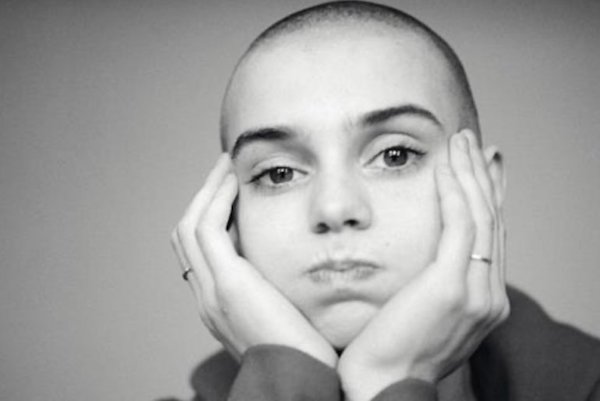
Sinéad OʼConnor in Nothing Compares.
Nothing Compares ~ Sinéad O’Connor’s rise to fame as a musical artist was fast and incendiary. Then a famous appearance on Saturday Night Live, in which she tore up a photo of the Pope (protesting the Catholic Church’s restrictive abortion laws in her native Ireland), led to her being booed and catcalled at a tribute concert for Bob Dylan. O’Connor’s career fizzled for a number of years, despite widespread support from fans. More recently, the singer’s struggles with the ups and downs of fame — and later with mental illness — have made her a social media icon. Kathryn Ferguson’s film centers on an intimate conversation with O’Connor that opens up into a survey of her musical career. The result is a showcase for the brilliance of an incomparable artist who was clearly decades ahead of her time.
My Old School ~ This unusual documentary employs a number of forms, including animation, to tell the true story of Brandon Lee, a student enrolled at a Glasgow school in the ’90s who was hiding a shocking secret. Using archival footage and interviews (voiced and acted out by Scottish actor Alan Cumming, who had been involved in a narrative film version of the story some years ago), this astonishing and somewhat disturbing narrative is a sort of lighthearted true crime narrative, albeit with intriguing class implications. Filmmaker Jono McLeod was a student at the same school, which gives this absorbing documentary an intimate, insider feel.
The Janes ~ This incendiary film is much more watchable than the rather saccharine feature Call Jane. Directed by Tia Lessin and Emma Pildes, The Janes tells the story of an underground anonymous organization that helped women get abortions in the ’60s and ’70s, when they were illegal. Surprising revelations abound. Issues of access for poor and non-white women receive scant attention, but they still provide an important backdrop to the film’s examination of the roots of the pro-choice movement. Given the overturning of Roe V. Wade this year, the release of this documentary could not be more significant or timely.
The Princess ~ A sure-handed debut by filmmaker Ed Perkins, this documentary about Princess Diana is composed entirely of archival footage from a variety of sources, including news media, television broadcasts, and amateur video. Presented in roughly chronological order, the film traces Diana Spencer’s entry into England’s royal family, her difficult marriage to Prince Charles, her devotion to her sons, her reputation as a fashion icon, and her humanitarian work as a goodwill ambassador who, among other accomplishments, helped lift the stigma surrounding AIDS patients. The film’s format and perspective suggest a stunning truth: that the “real” Diana was always out of sight. She was a construct of media and public projections, and it was the relentless, invasive journalistic coverage that hastened Diana’s tragic death.
Other noteworthy 2022 documentaries: The Pez Outlaw, Fire of Love, Goodnight Oppy, Loving Highsmith, Bitterbrush
Narrative Films I Very Much Enjoyed in 2022 — With Some Honorable Mentions Because of Minor Flaws

David Bowie in a scene from Moonage Daydream.
Moonage Daydream
Master
Women Talking
Holy Spider
Nope
Speak No Evil
You Won’t Be Alone
All Quiet on the Western Front
The Quiet Girl
Soft and Quiet
Bones and All
Stars at Noon
The Stranger
GDT’s Pinocchio
Living
Flux Gourmet
EO
Nanny
God’s Country
The Eternal Daughter
Aftersun
A Love Song
Crimes of the Future
God’s Creatures
After Yang
The Pale Blue Eye
The Quiet Girl
Honorable Mentions:
She Will (could have been a bit spookier)
Emily the Criminal (I love Aubrey Plaza and think she’s a great actress but I had a hard time believing the plot trajectory of this protagonist, and felt I didn’t know anything/enough about her to really buy into this; fun to watch, though)
Men (compelling, beautiful, provocative, outstanding performances, especially from Rory Kinnear, but yikes, that last ten minutes was gratuitous in the extreme, okay Alex, WE GET IT)
Tagged: Ed Symkus, Gerald Peary, Nicole Veneto, Peg Aloi, Steve Erickson
